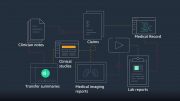What is misinformation and how does it impact public health?
Dissemination of information has accelerated in recent years, as society is now more connected than ever before. Today, channels such as social media play a significant role in providing information to the public, especially in uncertain and unpredictable times. In fact, the latest Ofcom news consumption survey reported that TikTok was the fastest growing source of news in the UK. However, while social media can be a valuable source of information, it’s important to exercise caution when using it, as it’s all too often plagued by misleading clickbait and fake news.
Health misinformation is defined as a health-related claim that is not supported by scientific evidence or expert opinions. According to research published in Science, inaccurate information reportedly travels faster and has the potential to reach a wider audience, than accurate information. It therefore has the potential to pose a significant threat to public health by spreading misinformation that could negatively alter people’s behaviours.
A recent World Health Organization’s (WHO) review showed that the dissemination of inaccurate clinical information has the potential to reduce the provision of healthcare, increase vaccine hesitancy, and has also been shown to negatively impact mental health. In light of this, it is essential that we, as healthcare information providers, take the necessary steps to reduce public exposure to health misinformation and develop interventions to mitigate the impact.
What does the World Health Organization review tell us about the challenges we are facing with misinformation in health?
The WHO review analysed 31 published studies that focused on fake news, misinformation and infodemics related to health. The findings highlighted that health-related crises are often coupled with an explosion of clinical information and an increase in incorrect interpretations of health information. It was particularly disheartening to learn more about the association between social media and the propagation of poor-quality health-related information, which was also shown to increase at an alarming rate during pandemics, humanitarian crises and health emergencies.
The review emphasised that healthcare information providers and healthcare professionals (HCPs) are best placed to refute misinformation and direct users to evidence-based information sources to help combat the issue. At Elsevier Health, we recognise that we have a role to play. We must continue to ensure that we are communicating the importance of providing accessible evidence-based health information through the appropriate channels.
What role do healthcare information providers need to play?
All stakeholders involved in the provision of healthcare have a crucial role to play in combating misinformation. We understand that in order to help HCPs provide accurate care, it is important to equip them with trusted, evidence-based sources to address the infodemic.
The need also extends to guiding the public to evidence-based sources so that they can also access current, credible data. It is therefore important that healthcare information providers provide HCPs and the public with evidence-based content to prevent them from filling the voids with inaccurate information.
What practical solutions are Elsevier Health putting in place to amplify the need for, and the importance of, disseminating evidence-based information?
As an organisation, Elsevier Health is committed to supporting current and future HCPs with trusted knowledge in an easy, accessible format. Our position allows us to curate accurate clinical data and develop solutions that disseminate accurate evidence-based information to ensure clinicians can be confident that the information they are using is credible.
We have developed of a variety of Healthcare Hubs, all of which serve as a trusted information centre of evidence-based knowledge, research and resources for the most pressing medical and healthcare issues. In order to support HCPs stay up to date with the latest clinical information on COVID-19, Elsevier Health developed the COVID-19 Healthcare Hub. In addition, Elsevier Health developed the Mpox Healthcare Hub in response to the recent outbreak, and the latest addition is the Reproductive Healthcare Hub, which provides reliable information to HCPs on topics including fertility, pregnancy and menopause.
Elsevier Health also wanted to amplify the lessons from COVID-19 on how to improve research culture for the better. Through the Future of Research Webinar series, we highlighted the value of data standardisation and harmonisation, the establishment of research networks to ensure high-quality research.
At Elsevier Health we are dedicated to supporting areas of unmet need and where access to data and evidence-based information can improve outcomes. With more than 7,000 rare diseases affecting over 300 million people globally combined with the lack of educational resources available, there is clearly a problem that needs to be addressed. We believe that our soon to be available open-access rare disease journal and Rare Disease Healthcare Hub will enable us to provide content and resources to educate future healthcare providers, improve diagnosis and accelerate rare disease research.
As we look ahead, how can healthcare providers help shape the future of the healthcare information environment?
The COVID-19 pandemic cast a spotlight on the resilience and agility of healthcare systems globally and emphasised the importance of conducting extensive research into infectious diseases. By delving into the development of pandemics, identifying effective diagnostic tools, and exploring potential treatments, we can mitigate future risks and ensure optimal care for those affected.
If healthcare information providers are to shape the future of the healthcare information landscape, we need to prioritise the dissemination of evidence-based information in order to correct the health misinformation that persists online. Elsevier Health must be open to hearing about the evolving challenges faced by HCPs and ensure that they are supported to provide optimal care. By providing HCPs with high-quality, evidence-based information in an accessible format we can together to develop solutions that’ll help HCPs and health organisations mitigate the consequences of future infodemics.
By Jan Herzhoff, President of Elsevier Health





